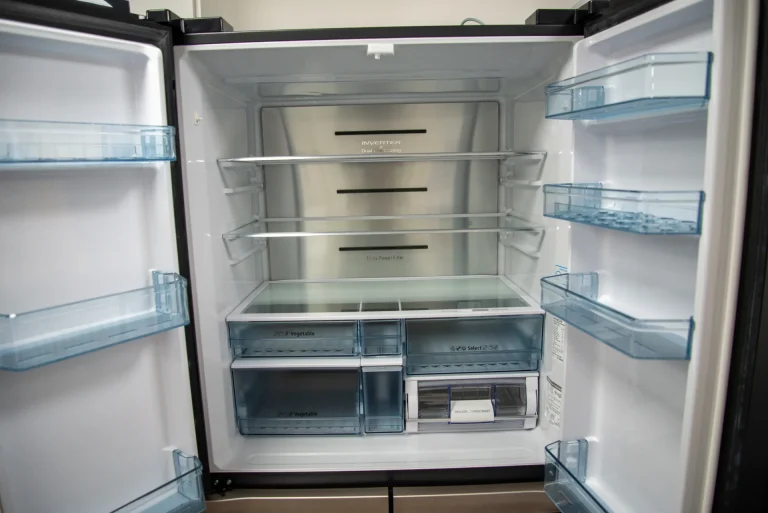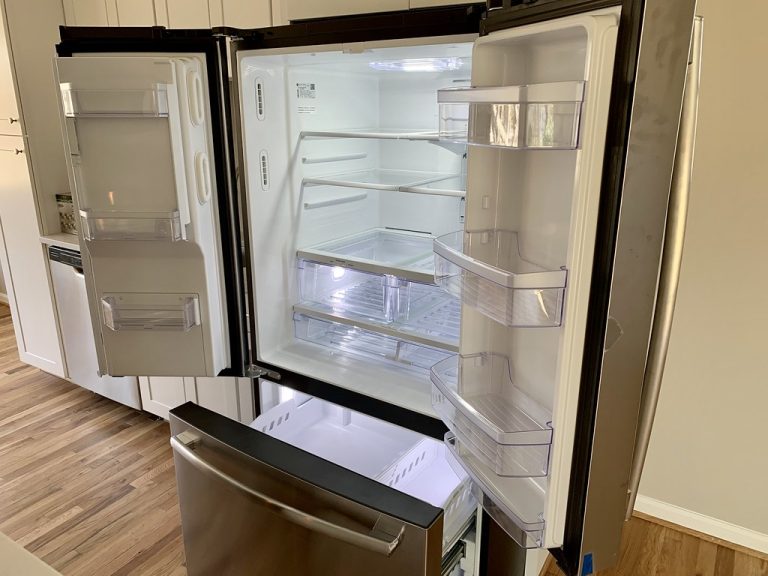Are Samsung Refrigerators Good [Expert Guide]
Yes, Samsung refrigerators are generally considered good and have gained popularity for several reasons. Here are some aspects where Samsung refrigerators are often praised:
- Innovative Features: Samsung is known for incorporating innovative features in their refrigerators, such as touchscreen controls, smart technology, and flexible storage options.
- Design: Samsung refrigerators are often praised for their modern and stylish designs, offering a range of finishes and configurations to suit different kitchen aesthetics.
- Energy Efficiency: Many Samsung refrigerator models are designed with energy-efficient features, contributing to reduced energy consumption and potential cost savings.
- Advanced Cooling Technology: Samsung refrigerators often utilize advanced cooling technologies to maintain optimal temperature levels and ensure food freshness.
- Smart Connectivity: Some Samsung refrigerators come with smart connectivity features, allowing users to control and monitor the appliance remotely through smartphone apps.
- Durability: Samsung is a reputable electronics brand, and their refrigerators are generally known for being durable and reliable.
Are Samsung Refrigerators Good or Bad?
Samsung refrigerators are generally considered good, but like any brand, individual experiences may vary. Here are some factors to consider:
1. Brand styling
Typically refers to the visual elements and design choices that contribute to the overall appearance and identity of a brand. This includes the use of consistent colors, fonts, logos, imagery, and other visual elements across various brand materials.
The goal of brand styling is to create a cohesive and recognizable brand image that communicates the brand’s personality, values, and message to the target audience.
Effective brand styling involves careful consideration of design elements to evoke specific emotions or associations related to the brand. This consistency in visual presentation helps build brand recognition and fosters a sense of trust and familiarity with consumers.
Key components of brand styling may include:
- Logo Design: A unique and memorable logo that represents the essence of the brand.
- Color Palette: A consistent set of colors that reflects the brand’s personality and resonates with the target audience.
- Typography: The use of specific fonts and text styles that complement the brand’s image.
- Imagery: The selection of images and visuals that align with the brand’s message and evoke the desired emotions.
- Graphics and Icons: Consistent use of graphical elements that enhance the brand’s visual identity.
- Layout and Composition: Consideration of how visual elements are arranged to create a harmonious and cohesive look.
2. Innovative Features
Refer to unique and advanced functionalities or characteristics that set a product or service apart from others in its category. These features often represent creative solutions to common challenges or needs, bringing new and improved capabilities to users.
In various industries, innovation is a key driver of competitiveness, and products or services with innovative features tend to attract attention and interest from consumers.
Examples of innovative features in different contexts include:
- Technology Devices: Smartphones with advanced camera systems, biometric security features, and augmented reality capabilities represent innovation in the tech industry.
- Home Appliances: Refrigerators with smart connectivity, touchscreens, and advanced cooling technologies showcase innovation in the home appliance sector.
- Automobiles: Electric vehicles with autonomous driving capabilities, advanced safety features, and energy-efficient technologies demonstrate innovation in the automotive industry.
- Healthcare Devices: Wearable fitness trackers that monitor various health metrics, telemedicine platforms, and personalized health apps exemplify innovation in healthcare technology.
- Software and Apps: Productivity software with AI-driven features, user-friendly interfaces, and innovative collaboration tools showcase advancements in the software industry.
3. Advanced Cooling Technology
Refers to sophisticated and innovative methods employed in cooling systems to enhance efficiency, maintain optimal temperatures, and improve overall performance. This technology is commonly utilized in various applications, including refrigeration, air conditioning, and electronic devices. Key aspects of advanced cooling technology often include:
- Variable-Speed Compressors: These compressors can adjust their speed based on cooling demands, providing more precise temperature control and energy efficiency.
- Inverter Technology: Commonly used in air conditioners and refrigerators, inverter technology allows for continuous regulation of compressor speed, reducing energy consumption and maintaining consistent cooling.
- Smart Sensors: Integration of sensors to monitor temperature, humidity, and other environmental factors, allowing the system to adjust cooling settings automatically for optimal performance.
- Dual Cooling Systems: Separately controlled cooling systems for the refrigerator and freezer compartments, preventing cross-contamination of odors and maintaining optimal conditions for different types of food.
- Thermal Management in Electronics: Advanced cooling solutions for electronic devices, such as laptops and smartphones, including heat pipes, liquid cooling, and graphene-based thermal materials to prevent overheating.
- Phase Change Materials (PCM): PCM technology absorbs and releases heat during phase transitions, providing efficient and effective thermal energy storage and management.
- Vortex Tube Technology: Applied in industrial cooling, vortex tubes use compressed air to create hot and cold air streams, offering a compact and energy-efficient cooling solution.
- Thermoelectric Cooling: Utilizing the Peltier effect, thermoelectric coolers can cool or heat surfaces when an electric current is applied, often employed in wine coolers and portable cooling devices.
![Are Samsung Refrigerators Good [Expert Guide]](https://homeplacetips.com/wp-content/uploads/2024/01/LG-VS-Samsung-Refrigerators-_-How-Do-They-Compare__000218885-1024x576.webp)
4. Smart Connectivity
Refers to the integration of devices, appliances, or systems with the internet or other communication networks, enabling them to connect, interact, and share data. This connectivity allows for remote control, automation, and the exchange of information between devices, often enhancing convenience, efficiency, and functionality. Smart connectivity is a key component of the broader concept of the Internet of Things (IoT).
Key aspects of smart connectivity include:
- Wireless Connectivity: Devices with smart connectivity often utilize wireless technologies such as Wi-Fi, Bluetooth, Zigbee, or other protocols to establish connections without the need for physical cables.
- Remote Control: Users can control and monitor smart-connected devices remotely through mobile apps, web interfaces, or voice commands, providing convenience and flexibility.
- Automation: Smart devices can be programmed to perform tasks automatically based on predefined conditions or user preferences, enhancing efficiency and energy savings.
- Data Sharing: Smart devices can share information with each other, creating a network where data from one device informs the operation of others, leading to a more interconnected and intelligent system.
- Voice Integration: Many smart devices are compatible with virtual voice assistants like Amazon Alexa, Google Assistant, or Apple’s Siri, allowing users to control devices through voice commands.
- Interoperability: Smart connectivity often involves devices that can communicate and work seamlessly with each other, promoting interoperability within a smart home or a broader IoT ecosystem.
Pros of Samsung Refrigerators:
- Innovative Features: Samsung refrigerators often come with innovative features such as touchscreen controls, smart technology, and flexible storage options.
- Design: Samsung is known for its modern and stylish refrigerator designs, offering a variety of finishes and configurations to suit different kitchen aesthetics.
- Energy Efficiency: Many Samsung refrigerator models are designed with energy-efficient features, contributing to reduced energy consumption and potential cost savings.
- Advanced Cooling Technology: Samsung refrigerators often incorporate advanced cooling technologies to maintain optimal temperature levels and ensure food freshness.
- Smart Connectivity: Some Samsung refrigerator models offer smart connectivity, allowing users to control and monitor the appliance remotely through smartphone apps.
- Variety of Models: Samsung provides a diverse range of refrigerator models, including French door, side-by-side, and bottom-freezer configurations, catering to different preferences and kitchen spaces.
Cons of Samsung Refrigerators
- Price: Samsung refrigerators can be relatively expensive compared to other brands, especially for models with advanced features.
- Occasional Issues: Like any brand, there have been occasional reports of issues such as ice maker problems or cooling issues with Samsung refrigerators. Individual experiences may vary.
- Repairs and Servicing: Some users have reported challenges with repairs and servicing, including delays or difficulties in obtaining parts.
- Learning Curve: The advanced features and technology in Samsung refrigerators may have a learning curve for users unfamiliar with smart appliances, potentially impacting ease of use.
- Subject to Technological Changes: Rapid technological advancements mean that newer models may offer additional features, potentially making older Samsung refrigerators seem less up-to-date over time.

How long do Samsung refrigerators last?
The lifespan of a Samsung refrigerator can vary based on factors such as usage, maintenance, and specific model details. On average, Samsung refrigerators are designed to last approximately 10 to 15 years.
However, the longevity of any refrigerator depends on how well it is maintained, the frequency of usage, and adherence to recommended care practices. Regular cleaning, proper storage habits, and prompt attention to any issues that may arise can contribute to extending the lifespan of a Samsung refrigerator.
Advancements in technology and changes in consumer needs may influence the decision to upgrade to a newer model before the end of the appliance’s typical lifespan. While Samsung is known for producing reliable and innovative refrigerators, individual experiences may vary, and factors such as regular maintenance and usage patterns play a significant role in determining the overall durability of the appliance.
Which is better Samsung or LG for fridge?
Choosing between Samsung and LG for a refrigerator often comes down to personal preferences, specific needs, and budget considerations. Both brands are reputable and offer a wide range of refrigerator models with innovative features.
Samsung is known for its modern designs, advanced technology, and sleek aesthetics. They often incorporate features like touchscreen controls and smart connectivity. On the other hand, LG is praised for its reliable performance, energy efficiency, and customizable storage options.
When deciding between Samsung and LG refrigerators, it’s essential to consider factors such as the specific features you prioritize, the available space in your kitchen, and any budget constraints.
Reading customer reviews, researching individual models, and comparing warranties can also help in making an informed decision. Ultimately, the “better” brand depends on your unique preferences and requirements, as both Samsung and LG offer high-quality refrigerators with their own set of advantages.

Which brands of refrigerators are the best?
Determining the best brands of refrigerators involves considering various factors such as reliability, innovative features, energy efficiency, and overall customer satisfaction. Several brands are consistently regarded as top performers in the refrigerator market.
Whirlpool is known for its reliable and durable appliances, offering a diverse range of models to suit different needs. Samsung and LG are recognized for their innovative designs and advanced technology, often incorporating smart features and modern aesthetics. Additionally, KitchenAid, a subsidiary of Whirlpool, is celebrated for its high-end refrigerators with premium features.
Ultimately, the best brand depends on individual preferences, specific requirements, and budget constraints. Reading customer reviews, researching specific models, and considering factors like energy efficiency and warranty coverage can help in selecting the brand that aligns best with your needs.
FAQ:
Q: Are Samsung refrigerators reliable?
A: Yes, Samsung refrigerators are generally considered reliable, offering innovative features and modern designs.
Q: How long do Samsung refrigerators typically last?
A: On average, Samsung refrigerators are designed to last approximately 10 to 15 years, depending on usage and maintenance.
Q: Are Samsung refrigerators energy-efficient?
A: Yes, many Samsung refrigerator models are designed with energy-efficient features to reduce energy consumption.
Q: Do Samsung refrigerators have common issues with the ice maker?
A: Some users have reported occasional issues with the ice maker, but experiences may vary.
Q: Is it safe to use a Samsung refrigerator on a wood deck?
A: Yes, it is generally safe to use a Samsung refrigerator, especially electric models, on a wood deck with proper precautions.
Q: Are Samsung refrigerators loud?
A: No, Samsung refrigerators are designed to operate quietly, with occasional sounds like ice maker activity within acceptable limits.
Q: Do Samsung refrigerators come with smart technology?
A: Yes, many Samsung refrigerator models offer smart technology, allowing remote control and monitoring through smartphone apps.
Q: Are Samsung refrigerators known for their design?
A: Yes, Samsung refrigerators are often praised for their modern and stylish designs, offering a variety of finishes.
Q: Can Samsung refrigerators be used in apartments?
A: Yes, Samsung refrigerators can be used in apartments, but it’s important to check with the apartment management regarding specific rules.
Q: Are Samsung refrigerators more expensive than other brands?
A: Samsung refrigerators can be relatively premium in terms of price, but they offer value for their features and performance.
As an Amazon Associate I earn from qualifying purchases.
- Can You Put Clouds Shoes in the Washing Machine? With Tips & Tricks - April 10, 2024
- European Washing Machine vs American – History, Design, Technology - March 27, 2024
- Can You Put Boxing Gloves In The Washing Machine? – Expert Tips - March 25, 2024

![Are Samsung Refrigerators Good [Expert Guide]](https://homeplacetips.com/wp-content/uploads/2024/01/LG-VS-Samsung-Refrigerators-_-How-Do-They-Compare__000176176.webp)
![GE Cafe Refrigerator Problems [Solved 2024]](https://homeplacetips.com/wp-content/uploads/2023/12/GE-refrigerator-not-cooling_-Check-these-5-things-first_000056819-768x432.webp)
![KitchenAid vs Bosch Refrigerator [Which One Fits Your Kitchen?]](https://homeplacetips.com/wp-content/uploads/2023/10/KitchenAid-vs-Bosch-Refrigerator-768x432.jpg)

![Whirlpool Fridge Making Loud Popping Noise? [Reasons & Fix]](https://homeplacetips.com/wp-content/uploads/2023/09/Whirlpool-Fridge-Making-Loud-Popping-Noise-768x461.png)

